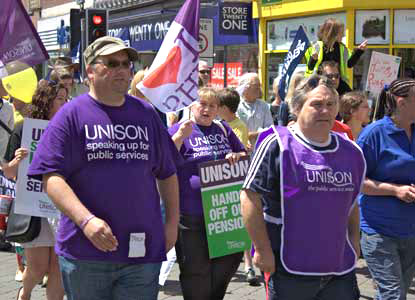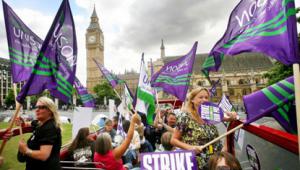Unison today launched a strike ballot of its 1.1 million public sector members over pension scheme changes.
 The move follows publication of the proposed increases in council staff contributions to the Local Government Pension
Scheme, part of ministers’ attempts to cut the costs of public sector pensions.
The Department for Communities and Local Government’s plans, published on
Friday, would increase staff’s contribution to pensions by an average of 1.5
percentage points of their pay.
The move follows publication of the proposed increases in council staff contributions to the Local Government Pension
Scheme, part of ministers’ attempts to cut the costs of public sector pensions.
The Department for Communities and Local Government’s plans, published on
Friday, would increase staff’s contribution to pensions by an average of 1.5
percentage points of their pay.The department proposes to raise £900m from increases in contributions, starting in April and phased over three years, and changes to the accrual rate.
Unison general secretary Dave Prentis said that the changes risk the future of the local government scheme and have forced the union into ‘the biggest ballot for industrial action that this country has ever seen’.
Public sector unions are already planning to strike on November 30 over the plans. Unison’s decision to ballot 1.1 million public sector members, including 750,000 council workers as well as NHS and civil service staff, represents the next step towards that.
Prentis said that eight months of negotiations with government had ‘made very little progress’.
The ballot will close on November 3, after the next planned talks between the unions, led by the Trades Unions Congress, and the Treasury on October 24.
The negotiations also cover changes to the civil service, NHS and teachers pensions following Lord Hutton’s Public Service Pensions Commission, which reported in March this year. The report recommended a move to a career average defined benefit instead of final salary and increases in the retirement age, which the government is also looking to implement.
The other public sector schemes, unlike local government, are not funded by investments but ‘pay as you go’ where existing members and government contributions meet the ongoing liabilities. Unison said that the NHS scheme is ‘cash rich’, with income exceeding outgoings by £2bn.
Prentis added: ‘We are willing to negotiate any time, anywhere and any place to make our scheme viable for the future and for public service workers. But at the same time, if people don’t pay into the scheme then it could go under. This is a fight for the survival of public sector pension schemes.’
Prentis said that the government’s decision to increase employee contributions was the ‘final resort’ for staff who have been subject to a two-year pay freeze.





















